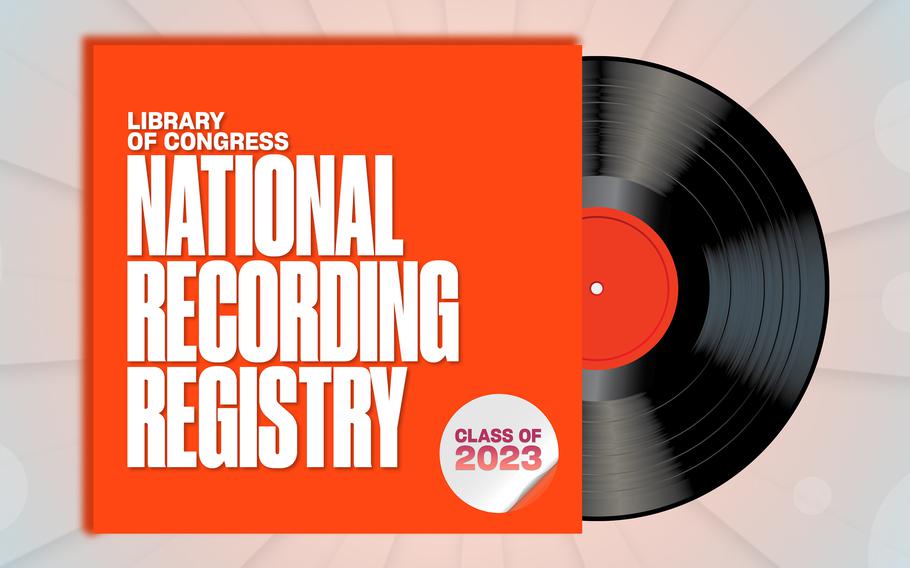
(Library of Congress)
For those who weren’t paying attention – and really, why would you be? – the Library of Congress last week announced its next crop of music set to be preserved as part of the National Recording Registry. What does that mean? Well, it means that the selected music is “part of the defining sounds of the nation’s history and culture.” Or something like that, at least. Either way, it’s supposed to be Important-with-a-capital-I.
Turns out, the LOC has been doing this for only a shockingly short period time – relatively speaking, of course. It was 2002 when the first batch of sounds was inducted. Among that class was “The Stars and Stripes Forever,” which I’m contractually obligated to list in a publication like this, as well as such classics as “Casey At The Bat,” “Rhapsody In Blue” and, naturally, FDR’s “Fireside Chats” broadcasts. In the 20 years since then, the Registry has picked-and-choosed its way into the center of a debate. Case in point: Take a look at some of the names of sounds going in this year.
Mariah Carey’s “All I Want For Christmas Is You,” the Police’s “Synchronicity” and, drumroll, please, John Lennon’s “Imagine.” All, to which I say, “I get it,” “Hmmm,” and “Wait, what?!”
That last part is because it confounds me to think that “Imagine” hasn’t already been designated as a defining sound of this nation’s history and culture. I mean, there are songs, and then there are … songs. It’s the difference between “Hallelujah” and “Smooth.” One is an all-time piece of art that will evoke every centimeter of your emotional aptitude each time you hear it, while the other is … a Rob Thomas duet. I’ve got all the love in the world for the Matchbox Twenty leader, but come on.
Like. Come on.

Mariah Carey performs a benefit for the Fresh Air Fund at the Cathedral of St. John the Divine in New York on Dec. 8, 1994, left, and Madonna performs as she opened her Virgin tour in Seattle, on April 10, 1985. An album from Madonna, a carol from Mariah Carey and music from “Super Mario Bros.” are among the audio titles the US. National Recording Registry. The Library of Congress announced Wednesday, April 12, 2023, that 25 recordings have been selected for preservation for their cultural significance. (AP)
As such, I thought I’d cull the history of this thing to see what’s in and what’s not, if only because I’m a masochist at heart. What I found was almost precisely what I thought I’d find: A bunch of, “Wait, but if this is in, that means this other thing should be in,” and “How could you acknowledge this person, but not this other person?” I understand the gravity of “defining sounds of a nation’s history and culture,” but you mean to tell me Jay-Z and Nas have some of their work listed here while Outkast is left feeling sorry about Ms. Jackson for all these years? Does that mean the “Defining sounds of a nation’s history and culture” actually means, “a nation’s northeastern history and culture”?
You can say I’m splitting hairs, but just look at how The Beatles are represented. “Sgt. Pepper’s Lonely Hearts Club Band” was named to the list in 2003, but until this year, nothing else from either the band or its artists has made the cut. You don’t think Paul McCartney wrote a song or two (or an album or two) that deserves a spot alongside “The Second Inauguration of Calvin Coolidge”? And yes, that’s a real thing (also, no, it’s not the latest LP from The National).
Therein lies my problem with the whole ordeal. We’re taking speeches, conversations, soundtracks to film and TV, and putting them alongside songs that really did shape American culture and history. That’s not to say that some of these speeches didn’t also help shape those things, but it is to say that it might be a good idea to draw a line. It’s the same debate that surrounds the Rock and Roll Hall of Fame. If it’s called Rock and Roll, why does Dolly Parton or Eminem belong?
Even so, the Rock Hall debate is as old as time and one of which I understand both sides. Depending on which mood you catch me in, I can agree or disagree with one or the other. But the National Recording Registry? Housed at the Library of Congress? That’s just a little more serious than Jann Wenner’s list of playground pals that dominated so many years of Rock Hall decisions. You would think “Imagine” would already be acknowledged. You would think if Sonic Youth’s “Daydream Nation” was worked into the fold in 2005, that would mean the Rolling Stones’ “(I Can’t Get No) Satisfaction” or Paul Simon’s “Graceland” wouldn’t have to wait until 2006, which they did.
It's all to say that last week’s announcement served as the latest reminder that anyone or anything that tries to establish sacred grounds for music simply doesn’t always get it right. Or, in some cases, the amount of time getting it right falls way short of the amount of time they, he, she or it gets it wrong. Like it or not, there are universal truths in music (or, hell, “sound” as they say here). As I said at the beginning of the year, “Use Me” is the best song ever written … according to me. Disagree, and that’s fine. But as a collective, are we, as music fans, supposed to buy into the notion that Chubby Checker’s “The Twist” deserved to be honored before the aforementioned “Hallelujah” or even Ben E. King’s “Stand By Me?” It happened. Chubby got the nod in 2012 while Jeff Buckley and King had to wait until 2013 and 2014, respectively.
Perhaps the most egregious decision came last week, when the Registry announced that among this year’s honorees will be the music of “Super Mario Bros.” Still not recognized? Chuck Berry’s “Johnny B. Goode.” Something tells me it’ll be more than just Beethoven rolling over if the Father of Rock and Roll gets word of such an atrocity up there in Music Heaven.
Even King Koopa would agree.